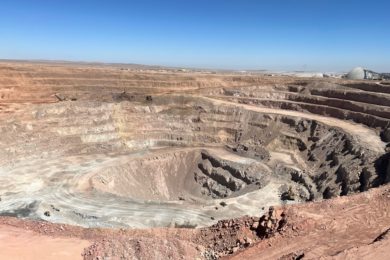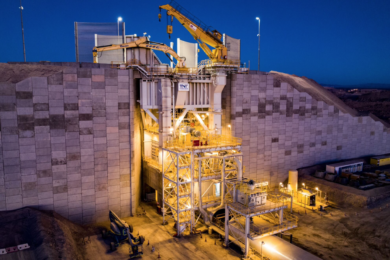TOMRA Mining says it is in the process of installing what will be the world’s largest lithium mineral ore sorting plant at Pilbara Minerals’ Pilgangoora project in Western Australia.
The installation has already started and is expected to reach completion in late 2023.
Pilbara Minerals says it owns the world’s largest, independent hard-rock lithium mine, producing a spodumene and tantalite concentrate. Through its P680 Expansion Project, the company has plans to step-up its production run-rate at the operation to a total of circa-680,000 t/y of spodumene concentrate. The sorting plant is part of this project.
Dale Henderson, Managing Director and CEO, Pilbara Minerals, said: “This new facility to be constructed at our Pilgangoora Project will be the world’s largest lithium mineral ore sorting plant. TOMRA’s experience in large global sorting installations, innovative technology and ability to provide local support were significant factors in our decision to work with them. From the start, the TOMRA team has been working side by side with us and our engineering partner DRA Global to deliver this important project.”
As part of this expansion project, Pilbara Minerals turned to TOMRA Mining for assistance to address the key industry challenge in the processing of spodumene feed ore contaminated with barren host rock.
TOMRA has 50 years’ experience in sensor-based sorting technologies and has designed and built 90% of the world’s large-scale mining sorting plants with a capacity above 300 t/h, it says. These include plants such as the Ma’aden Umm Wu’al project, which is operating at 1,850 t/h and the Lucara diamond operation which runs 15 sorters.
Specifically for the Pilbara Minerals project, TOMRA Mining highlighted that it offered effective ore sorting solutions with high sensor resolution and ejection accuracy that ensure high lithium recovery and waste removal with a stable and consistent performance at high capacity.
The TOMRA Mining team conducted a geological assessment of sample ores supplied by Pilbara Minerals. It revealed the pegmatite deposit did have non-lithium bearing host rock intrusions. Some of these minerals have a high density like that of spodumene, which means that it is also concentrated when using heavy media separation (HMS). This reduces the efficiency of the downstream flotation and contaminates the final product. Sensor-based sorting technologies, on the other hand, can measure the colour, density and mineralogical variations in individual particles, enabling the accurate detection and removal of this barren material, the company explained.
Working closely with the Pilbara Minerals metallurgical team, TOMRA conducted extensive test work at the TOMRA Test Center in Sydney, Australia, to check all the options and answer any questions arising during the tests.
The samples were run at capacity on production sorters and included repeatability and variation testing. The test work benchmarked the expected performance of the sorters and was used to establish the sort quality on each of the ore types that will be fed through the plant.
Primero Group, which was awarded the contract for construction of the project, has now started bulk earthworks for the sorting plant.
The TOMRA team was involved not only in the testing and supply of equipment, but also provided assistance with the plant layout and understanding of the implications of sorting on the upstream mining and downstream process of the ore. This involvement throughout the development process will add to efficient operational ramp-up and technical optimisation.
TOMRA’s capability to support the project with a dedicated Australia-based team and a global support structure has been a significant factor and is an important part of de-risking the installation of this new technology. The team is working closely with Pilbara Minerals through the installation process, commissioning and start-up, and will continue to provide on-site support once the sorting plant is up and running.










